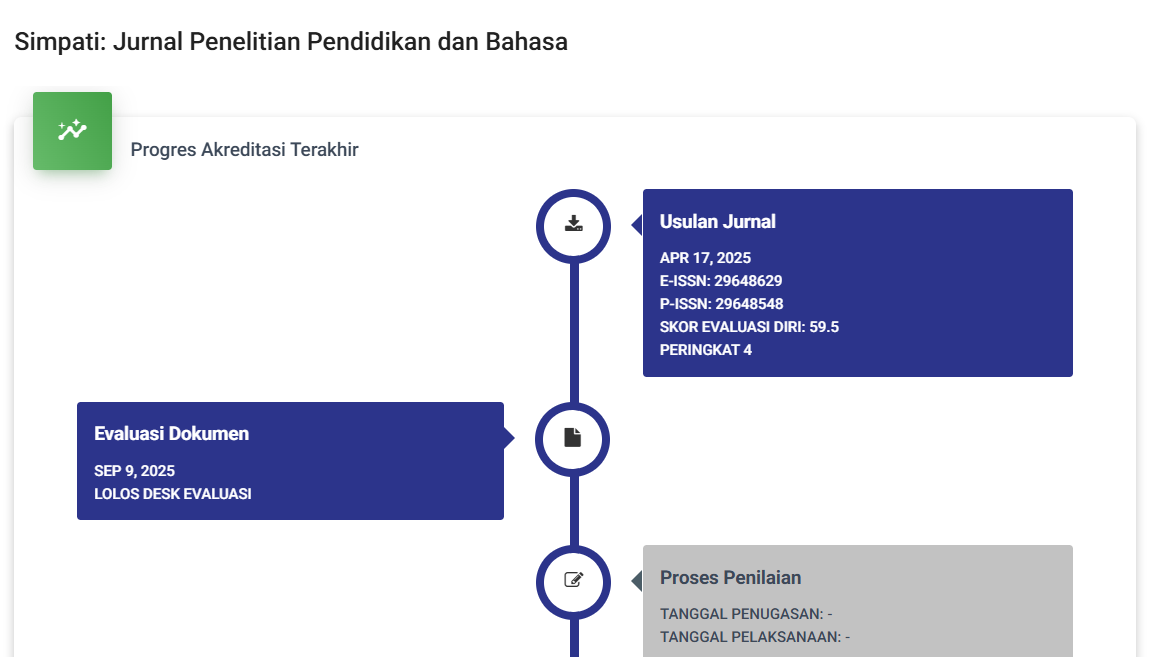Sikap Guru Terhadap Anak yang Malas Belajar di Kelas
DOI:
https://doi.org/10.59024/simpati.v1i3.226Keywords:
teacher, lazy to studyAbstract
The success of a nation is greatly influenced by its young generation. Teachers are the main actors in education in schools. Education is a human effort in order to develop the potential of students to the maximum. In the learning process, there are still many students who have learning difficulties. The focus of this writing discusses learning difficulties in terms of children who are lazy to learn. Teachers as educators must be able to analyze the problems of students who are lazy to learn and find solutions to overcome them. The success of a nation is greatly influenced by its young generation. Teachers are the main actors in education in schools. Education is a human effort in order to develop the potential of students to the maximum. In the learning process, there are still many students who have learning difficulties. The focus of this study discusses learning difficulties in terms of children who are lazy to learn. Teachers as educators must be able to analyze the problems of students who are lazy to learn and find solutions to overcome them. The role of the teacher is not only as teaching lessons that have been compiled in the curriculum, but also as a guide, class manager, motivator, facilitator, inspiration, and many other teacher tasks. The cause of students who are lazy to learn is caused by two factors, internal factors (within students) and external factors (outside of students). The method used in this study is descriptive qualitative by making observations and interviews and looking from other articles to support statements that have been found in the field.
References
Adinda, A. P., Gaos, A. N. F., & Fatimah, R. S. N. (2020). Pelaksanaan layanan bimbingan untuk mengatasi anak yang malas belajar. ISLAMIKA, 2(1), 170-175.
Darmadi, H. (2015). Tugas, peran, kompetensi, dan tanggung jawab menjadi guru profesional. Edukasi: Jurnal Pendidikan, 13(2), 161-174.
Hts, K. P. (2017). Peran Konselor dalam Membantu pengentasan malas belajar siswa. JRTI (Jurnal Riset Tindakan Indonesia), 2(2).
Ismail. (2016). Diagnosis Kesulitan Belajar Siswa dalam Pembelajaran Aktif dalam Membangun self control Remaja di Sekolah, Jurnal Keislaman, 7(1).
Laoli, R. Y., Widiastuti, M., Situmeang, R. G., Pardede, R. T., Hutagalung, T. L., & Sitorus, S. A. (2022). STUDI KASUS PADA PESERTA DIDIK, ANAK YANG MALAS BELAJAR. Jurnal Pendidikan Sosial dan Humaniora, 1(4), 230-235.
Sanjani, M. A. (2020). Tugas dan peranan guru dalam proses peningkatan belajar mengajar. Serunai: Jurnal Ilmiah Ilmu Pendidikan, 6(1), 35-42.
Suartini, N. W. P. (2022). Analisis Kesulitan Belajar pada Siswa Kelas II SD. Journal of Education Action Research, 6(1).
Tanjung, A. (2022). UPAYA GURU DALAM MENGATASI KESULITAN BELAJAR SISWA KELAS V PADA MATA PELAJARAN PAI DI SDN UPTD 063 MOMPANG JAE. Edu Global: Jurnal Pendidikan Islam, 3(1), 1-10.
Undang-undang Republik Indonesia Nomor 14 Tahun 2005. Tentang Guru dan Dosen.
Undang-Undang RI, Guru Dan Dosen Sisdiknas, Cet. 1; Surabaya: Wacana Intelektual, 2009.
Warif, M. (2019). Strategi Guru Kelas dalam Menghadapi Peserta Didik yang Malas Belajar. TARBAWI: Jurnal Pendidikan Agama Islam, 4(01), 38-55.
















